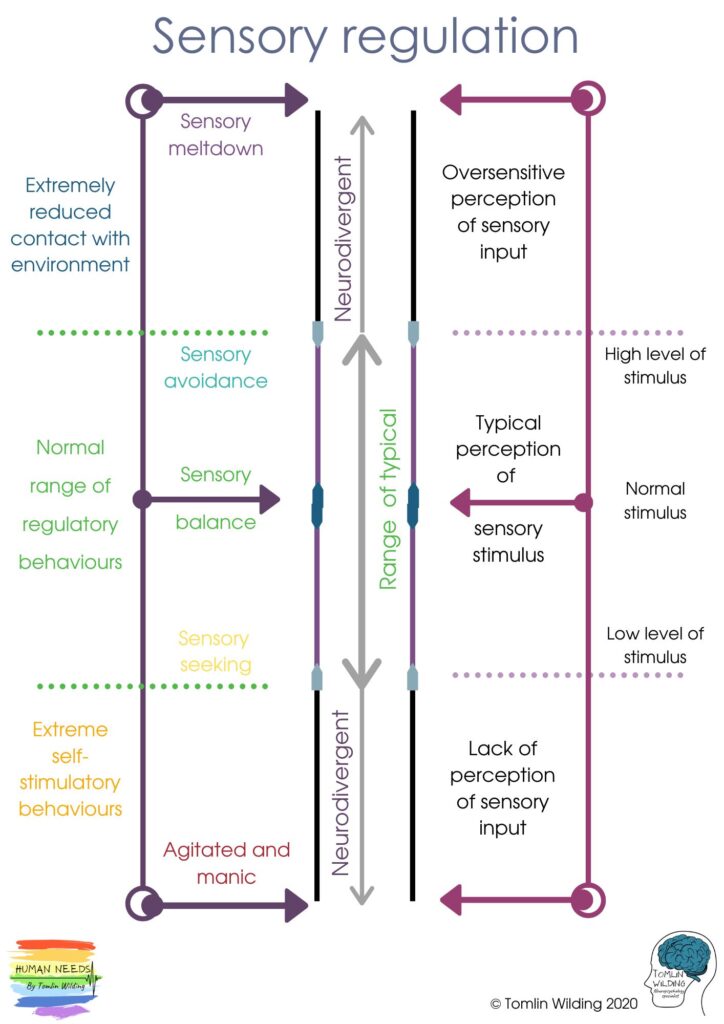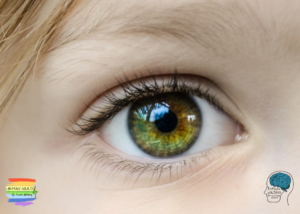Sensory regulation
Sensory regulation is one of the five areas that humans need to have regulated in order to survive and thrive. We need an appropriate balance of stimulation from our environment, providing us with information, and rest from that stimulation to enable us to process it. Our actions and behaviours seek to regulate this input through gentle seeking and avoiding behaviours. However, if we either experience too much or too little stimulation and fail to naturally regulate, our behaviours will become more extreme.
The sensory brain
It has become increasingly clear from research that not only does the brain respond to sensory input when it occurs, it can also become overwhelmed by sensory input. What is more surprising is that our brains need a certain amount of sensory input to function well. Too little is often as unhelpful as too much. Without an appropriate balance of receiving sensory input, and having a break from it, humans become dysregulated, and emotional response or even possibly threat responses are activated.
Sensory input
In balancing or regulating the senses how much sensory stimuli is in our environment has an impact. Using sound as an example again, in an incredibly quiet or silent environment for extended periods humans can become under-stimulated. In an environment in which there are very loud noises, many competing noises, or noises the person finds unpleasant, overstimulation can occur. If stimuli is extreme at either end of the spectrum, any person can struggle.
Sensory sensitivity
It is also essential to understand that every human being is individual, and our sensory sensitivity can vary to enormous degrees. Some of us have more taste buds than others, or our taste buds are more sensitive, or the brain signals that are received from our taste buds stimulate a more intense response or perception.
Sensitivity is not consistent either, varying across modalities, in which one person can be very sensitive to sound, but completely lacking in sensitivity to movement. Variation may occur in sub modalities as well, with one person being overly sensitive to bitter tastes, whilst being under sensitive to sweetness.
It is understood that where a person seems to be more sensitive to sensory input, it could be a difference in the sensory receptor, or in the neurological make-up in the cortex that processes that information. Neurodivergent people (people with neurological differences such as autism or ADHD) have fundamental differences in their neurological make-up which, almost always results in sensory sensitivity and sensory processing differences, at one extreme or the other.
However, it isn’t just neurodivergent people. Our sensitivity changes throughout our life span, with babies and young children experiencing the world almost entirely through their senses, senses being heightened in pregnancy, and some sensory sensitivity increasing and others decreasing in later life.
Sensory regulation behaviour
We have natural instincts to regulate our senses and you may be surprised to realise that some of the things you do, or the choices you make, are regulatory. These behaviours are more likely, more frequent and more intense in people who have sensory sensitivity or processing differences.
Sensory avoidance
People who are experiencing too much sensory input will display sensory avoidant behaviours, either by avoiding certain situations, or finding techniques to mediate the data that is being received.
Sensory seeking
People who are not experiencing enough sensory input will display sensory seeking behaviours. They might choose stimulating environments, activities, or interactions.
Self-stimulatroy behaviours (stimming)
Additionally humans commonly engage in creating their own stimuli for their senses with their bodies, known as self-stimulatory behaviour, or “stimming”. Many people think that this is a distinctive feature of neurodivergence, but everyone “stims” to some degree. Completely neurotypical (people with normal neurology) people do repetitive things such as tap their pens, jiggle their legs, or twirl their hair (these are just three example of hundreds). However, neurodivergent people will have more stimulatory behaviours, they are likely to be more intense, and be repeated more frequently. Common stims associated with neurodivergence are making sudden loud noises, flapping hands, twirling in circles, rocking back and forth, bouncing on chairs and repetitive blinking.

Understanding a complex system
This diagram may seem complex, and it is, but try to look at it one part at a time. The entire of the left hand side of the page shows behaviour, reaction and response, whereas the right hand side relates to the input and processing of stimuli.
The centre lines indicate that there is a range of normal variation according to the level of stimuli and sensitivity, but that in neurodivergent brains, that scale is increased to experience extremes. This helps us to understand that everyone does things such as tap their pencil, jiggle their leg or hum to themselves to create input for their brain. Equally anyone might feel overwhelmed by a multitude of loud noises, or specific types of lighting. This is normal.
However, neurodivergent people spend more time in the extremes of the scale, displaying more sensory seeking, self-stimulatory, and sensory avoidant behaviours, or potentially tipping over their threshold into manic, meltdown or shutdown.
Sensory regulation words
- Soothing
- Wonderful
- Comfortable
- Feel
- Beautiful
- Mesmerised
- Calm
- Gentle
- Settled
- Ease
- Relief
- Relaxed
- Energised
- Balanced
Sensory dysregulation words
- Overwhelming
- Hyperactive
- Too much / many
- Freaking out
- Manic
- Lethargic
- Meltdown
- Shutdown
- Hurt / pain
- Crushing
- Repetitive
- Can’t
- Annoying
- Awful
- Multiple
- Uncomfortable
- Nauseous
- Triggered
- Listless
- Reactive






